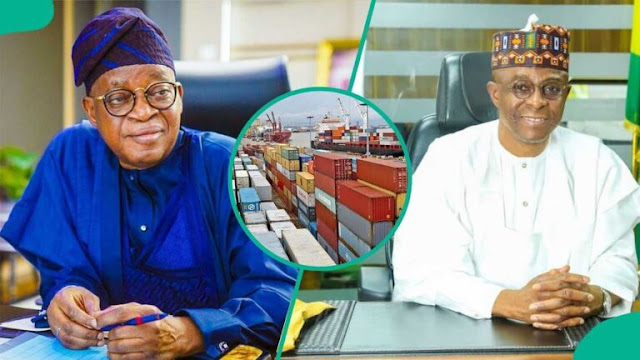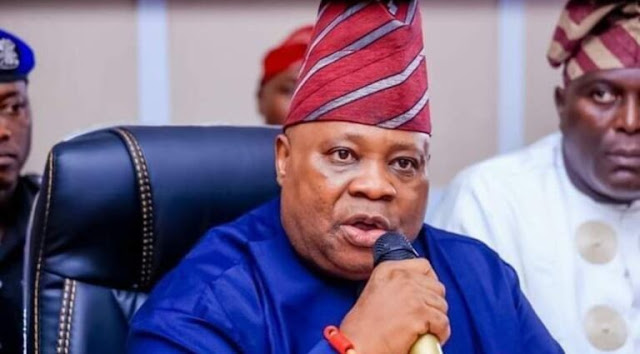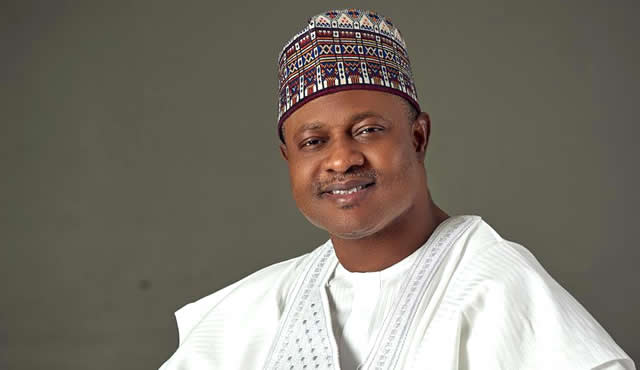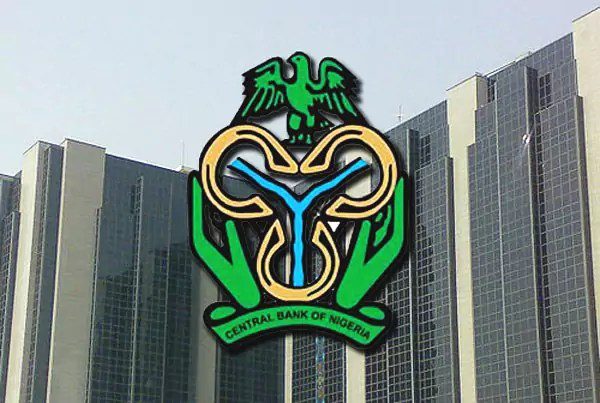On Wednesday, August 27, 2025, the Minister of Marine and Blue Economy, Adegboyega Oyetola, extended heartfelt congratulations to Dr. Abubakar Dantsoho, Managing Director of the Nigerian Ports Authority (NPA), on his election as Vice President of the International Association for Ports and Harbours (IAPH). The announcement, conveyed through a statement by Dr. Bolaji Akinola, Oyetola’s Special Adviser on Media and Communications, in Lagos, underscored Dantsoho’s achievement as a testament to his leadership and Nigeria’s growing influence in the global maritime sector. The minister highlighted the significance of Dantsoho’s role in shaping international maritime policy and advancing Nigeria’s port modernization program, which aligns with the Federal Government’s broader blue economy agenda. This article delves into the details of Dantsoho’s election, the implications for Nigeria’s maritime industry, the government’s port modernization efforts, and the broader context of Nigeria’s ambitions to become a leading maritime hub in Africa.
A Milestone for Nigeria’s Maritime Sector
The election of Dr. Abubakar Dantsoho as Vice President of the IAPH marks a significant milestone for Nigeria’s maritime industry and its standing in the global arena. The IAPH, a prestigious organization representing over 300 ports and port-related companies across 90 countries, serves as a consultative partner to the International Maritime Organization (IMO) and other United Nations agencies. Its role in shaping global port policy, promoting sustainable growth, and fostering international cooperation makes Dantsoho’s appointment a powerful endorsement of his leadership credentials and Nigeria’s rising prominence.
Minister Oyetola described the election as a reflection of Dantsoho’s expertise and the progress achieved through Nigeria’s port modernization program. “This election reflects the reforms undertaken to reposition Nigerian ports and advance the blue economy agenda of the Federal Government,” he stated. The minister’s remarks highlight the strategic importance of Dantsoho’s role, which positions Nigeria at the forefront of international maritime discussions and enhances its ability to collaborate with other nations on critical issues such as trade, sustainability, and port efficiency.
Dantsoho’s election is particularly significant given the IAPH’s influence in the global maritime industry. As Vice President, he will contribute to shaping policies that address emerging challenges, such as climate change, digitalization, and supply chain resilience. His expertise, honed through years of leadership at the NPA, equips him to represent Nigeria’s interests while promoting sustainable and innovative practices in the global port community.
The Significance of the IAPH
The International Association for Ports and Harbours, founded in 1955, is a globally respected institution that plays a pivotal role in the maritime industry. Representing ports and port-related businesses from 90 countries, the IAPH serves as a platform for collaboration, knowledge-sharing, and policy development. Its status as a consultative partner to the IMO, a UN agency responsible for regulating international shipping, underscores its influence in shaping global maritime standards.
The IAPH’s mission is to promote sustainable growth, enhance operational efficiency, and address challenges facing the port industry. This includes advocating for environmentally friendly practices, integrating advanced technologies, and fostering cooperation to improve global trade networks. By electing Dantsoho as Vice President, the IAPH recognizes Nigeria’s potential to contribute to these goals, particularly as the country seeks to position itself as a leading maritime hub in Africa.
Dantsoho’s role will involve engaging with international stakeholders to address pressing issues such as port congestion, cybersecurity, and climate resilience. His position also offers Nigeria an opportunity to influence global port policies, ensuring that the country’s interests—such as trade facilitation and regional integration—are prioritized in international discussions. This platform will enable Nigeria to showcase its port modernization efforts and attract investment to further enhance its maritime infrastructure.
Dr. Abubakar Dantsoho: A Leader for Nigeria’s Maritime Future
Dr. Abubakar Dantsoho’s election as IAPH Vice President is a testament to his leadership and expertise in the maritime sector. As Managing Director of the NPA, Dantsoho has overseen significant reforms aimed at improving the efficiency, security, and competitiveness of Nigerian ports. His tenure has been marked by efforts to modernize port infrastructure, streamline operations, and enhance collaboration with private sector partners.
Oyetola expressed confidence in Dantsoho’s ability to make meaningful contributions to the IAPH, stating, “Dantsoho’s expertise and extensive experience will enable him to bring meaningful contributions to the IAPH.” This confidence is rooted in Dantsoho’s track record of driving transformative change at the NPA, including the adoption of digital technologies, improvements in port security, and initiatives to enhance trade facilitation.
Dantsoho’s leadership comes at a critical time for Nigeria’s maritime sector, which is undergoing a comprehensive modernization program. His role at the IAPH will amplify Nigeria’s voice on the global stage, enabling the country to share its experiences and learn from international best practices. By leveraging his position, Dantsoho can advocate for policies that support Nigeria’s blue economy agenda, including sustainable port development, regional trade integration, and environmental stewardship.
Nigeria’s Port Modernization Program
The Federal Government’s port modernization program, highlighted by Minister Oyetola, is a cornerstone of Nigeria’s strategy to transform its maritime sector and advance its blue economy. The program encompasses a broad-based approach to upgrading port infrastructure, integrating advanced technologies, and improving operational efficiency. “It affirms our commitment to building a more efficient, secure, and globally competitive maritime sector, which remains central to our economic growth strategy,” Oyetola said.
Nigeria’s ports, including major hubs like Lagos (Apapa and Tin Can Island), Onne, Port Harcourt, and Calabar, are critical gateways for international trade, handling over 80% of the country’s imports and exports. However, challenges such as congestion, outdated infrastructure, and bureaucratic inefficiencies have historically hindered their performance. The modernization program seeks to address these issues through strategic investments and reforms.
Key components of the program include the rehabilitation of port facilities, the deployment of digital technologies such as automated cargo tracking and port management systems, and the enhancement of security measures to combat smuggling and piracy. The government is also investing in dredging to accommodate larger vessels, improving road and rail connectivity to ports, and streamlining customs processes to reduce delays. These efforts aim to raise Nigerian ports to global benchmarks, positioning the country as a competitive player in the international maritime industry.
The modernization program aligns with Nigeria’s blue economy agenda, which seeks to harness the economic potential of its marine resources, including shipping, fisheries, and offshore energy. By improving port efficiency, Nigeria aims to boost trade, attract foreign investment, and create jobs, contributing to broader economic growth. The program also emphasizes sustainability, with initiatives to reduce carbon emissions, protect coastal ecosystems, and promote environmentally friendly practices in port operations.
The Blue Economy and Nigeria’s Economic Strategy
The blue economy, encompassing the sustainable use of marine and aquatic resources, is a central pillar of Nigeria’s economic diversification strategy. With a coastline spanning over 850 kilometers and access to the Gulf of Guinea, Nigeria is uniquely positioned to leverage its maritime resources for economic growth. The establishment of the Ministry of Marine and Blue Economy in 2023, under President Bola Ahmed Tinubu’s administration, reflects the government’s commitment to unlocking this potential.
Minister Oyetola’s leadership has been instrumental in advancing the blue economy agenda. By prioritizing port modernization, the ministry aims to enhance Nigeria’s role as a regional trade hub, facilitating commerce with West African neighbors and beyond. The blue economy also offers opportunities in sectors such as aquaculture, marine tourism, and renewable energy, which can drive job creation and economic resilience.
Dantsoho’s election to the IAPH strengthens Nigeria’s position in global maritime discussions, providing a platform to advocate for policies that support the blue economy. His role will enable Nigeria to collaborate with other nations on issues such as sustainable shipping, port digitalization, and climate adaptation, ensuring that the country remains competitive in a rapidly evolving industry.
The Broader Implications for Nigeria
Dantsoho’s election and the port modernization program have significant implications for Nigeria’s economic and geopolitical standing. As Africa’s largest economy and most populous nation, Nigeria plays a critical role in regional and global trade. Strengthening its ports and maritime sector enhances its ability to serve as a gateway for West Africa, facilitating trade with landlocked countries like Niger and Chad.
The modernization of Nigerian ports also has the potential to attract foreign direct investment, as international companies seek efficient and secure trade routes. By aligning with global benchmarks, Nigeria can compete with other African ports, such as those in South Africa and Morocco, positioning itself as a leading maritime hub on the continent. This, in turn, can boost economic growth, create jobs, and reduce Nigeria’s dependence on oil revenue.
The focus on sustainability, as emphasized by both Oyetola and Dantsoho, aligns with global trends in the maritime industry. Climate change and environmental degradation pose significant challenges to ports, particularly in coastal areas vulnerable to rising sea levels and extreme weather. By adopting sustainable practices, Nigeria can contribute to global efforts to combat climate change while protecting its marine ecosystems.
Challenges and Opportunities
While Nigeria’s port modernization program and Dantsoho’s IAPH role present significant opportunities, they also come with challenges. The maritime sector faces issues such as corruption, bureaucratic delays, and security threats, including piracy in the Gulf of Guinea. Addressing these challenges requires robust governance, transparency, and collaboration with international partners.
The cost of modernizing port infrastructure is another hurdle, as Nigeria grapples with competing budgetary priorities. Securing funding through public-private partnerships, international loans, and private investment will be critical to sustaining the program. Engaging local communities and stakeholders is also essential to ensure that modernization efforts benefit all Nigerians, particularly those in port-adjacent areas.
Despite these challenges, the opportunities are immense. Dantsoho’s position at the IAPH provides Nigeria with a global platform to advocate for its interests and learn from international best practices. The modernization program can enhance Nigeria’s trade competitiveness, create jobs, and drive economic diversification. By prioritizing sustainability, Nigeria can also contribute to global environmental goals, positioning itself as a leader in the African maritime sector.
The Role of Collaboration
The success of Nigeria’s maritime ambitions depends on collaboration across government, industry, and international partners. The Ministry of Marine and Blue Economy’s partnership with the NPA, as exemplified by Oyetola and Dantsoho’s leadership, demonstrates the importance of coordinated efforts. The involvement of organizations like the IAPH and IMO provides Nigeria with access to global expertise and resources, enhancing its ability to address complex challenges.
Private sector involvement is also critical. Companies like APM Terminals, which operate key Nigerian ports, play a vital role in driving modernization and efficiency. By fostering public-private partnerships, Nigeria can leverage private sector innovation and investment to achieve its maritime goals.
Community engagement is another key component. Ports like Lagos and Onne are surrounded by communities that rely on the maritime industry for their livelihoods. Ensuring that these communities benefit from modernization efforts—through job creation, infrastructure development, and environmental protection—is essential for building trust and ensuring sustainability.
Conclusion
The election of Dr. Abubakar Dantsoho as Vice President of the IAPH, celebrated by Minister Adegboyega Oyetola on August 27, 2025, marks a significant achievement for Nigeria’s maritime sector. Dantsoho’s role enhances Nigeria’s influence in global maritime policy, while reflecting the progress of the Federal Government’s port modernization program. Oyetola’s leadership in advancing the blue economy agenda, through infrastructure upgrades, technological integration, and sustainability initiatives, positions Nigeria as a potential maritime hub in Africa.
The modernization program, coupled with Dantsoho’s global role, offers opportunities to boost trade, attract investment, and drive economic growth. While challenges like funding, corruption, and security remain, Nigeria’s commitment to collaboration and sustainability provides a strong foundation for progress. As the country continues to modernize its ports and engage with international partners, it is poised to unlock the full potential of its maritime sector, contributing to a more prosperous and sustainable future for all Nigerians.






